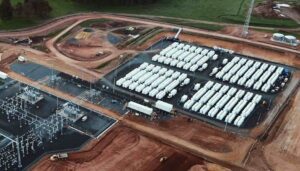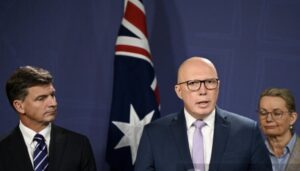There are signs the climate movement could be on the verge of a remarkable and surprising victory. If we read the current context correctly, and if the movement can adjust its strategy to capture the opportunity presented, it could usher in the fastest and most dramatic economic transformation in history. This would include the removal of the oil, coal and gas industries from the economy in just a few decades and their replacement with new industries and, for the most part, entirely new companies. It would be the greatest transfer of wealth and power between industries and countries the world has ever seen.
To understand this incredible potential we first have to step back and understand the unique structure of this social change movement, which may rank among the most influential in history. It is simplistic to characterise it as an alliance of grass-roots organisations and activists pitched against a rich and well-connected adversary. While that is part of the story, it is more accurately understood as an idea whose tentacles reach into every tier of government, the world’s largest companies and financial institutions, and throughout the academic and science communities.
Because of this, it is winning the battle from within: Its core arguments and ideas are clearly right; being endorsed by the world’s top science bodies and any significant organisation that has examined them.
Far from being at society’s margins it has the support, to various degrees, of virtually all governments and many of the world’s most powerful political leaders, including the heads of state of the USA, China and other leading economies. It counts the CEO’s of many global companies and many of the world’s wealthiest people as active supporters – who between them direct hundreds of billions of dollars of capital every year towards practical climate action. And of course, this comes on top of one of the most global, best-funded, broadly-based and bottom-up community campaigns we have ever seen.
That is the reality of the climate movement – it is massive, global, powerful, and on the right side of history.
So why, many ask, has it so far not succeeded in its objective of reducing CO2 emissions? Much has been written on this topic but most of it is wrong. It is simply an incredibly big job to turn on its head the global economy’s underpinning energy system. And so it has taken a while. Considering how long other great social movements took to have an impact – such as equality for women or the end of slavery and civil rights movements – then what’s surprising is not that the climate movement hasn’t yet succeeded. What’s surprising is how far its come and how deeply it has become embedded in such a short time.
And now is the moment when it’s greatest success might be about to be realised – and just in time.
We are at the most important moment in this movement’s history – in the midst of two simultaneous tipping points that create the opportunity, if we respond correctly, to win – eliminating net CO2 emissions from the economy and securing a stable climate, though still a changed one.
I have come to this conclusion after reflecting on a year when an avalanche of new knowledge and indicators made both tipping points clear. The first and perhaps the best understood is the rapid acceleration in climate impacts, reinforcing the view many hold that the scientific consensus on climate has badly underestimated the timing and scale of climate impacts. The melting of the Arctic Sea Ice, decades before expected, was the poster child of this but extreme weather and temperature records across the world, notably in the USA, suggested this Arctic melting is a symptom of accelerating system change.
It also became clear that this was literally just the “warm up” act – that we are currently heading for a global temperature increase of 4°C or more, double the agreed target.
In response came a series of increasingly dire warnings from conservative bodies like the International Energy Agency, the World Bank and the International Monetary Fund. Perhaps most colourfully, the IMF chief and former conservative French finance minister, Christine Lagarde, said that without strong action “future generations will be roasted, toasted, fried and grilled”. The World Bank was similarly blunt about the economic consequences of our current path: “there is also no certainty that adaptation to a 4°C world is possible.”
These and other reports laid out the evidence that the only option was transformational economic change because the alternative was simply unmanageable. Action was no longer a preferred outcome but an essential one. As the World Bank said “the projected 4°C warming simply must not be allowed to occur”. Even the IEA, historically a kind of advocate in chief for the fossil fuel industry, came on board, pointing out that a stable climate and economy requires the majority of the global reserves of fossil fuels to never be burnt.
It is an extraordinary turn around when key mainstream economic institutions lay out the case for dismantling what is arguably the world’s most powerful business sector.
Of particular note in all this, observing both the message and the messengers, is that what was predominantly an ecological question is now primarily an economic one. This is a profoundly important shift, as economic risk is something society’s elites take very seriously. It also unleashes another major potential tipping point which we seen signs of but is not yet in full flight. When non-fossil fuel companies understand the broad economic risk posed by the lack of climate action, they will become genuine and strong advocates demanding climate action – in their own self-interest. This is one to watch carefully as it will see a major shift in the politics when it comes.
The second tipping point in 2012 was the clear evidence that a disruptive economic shift is already underway in the global energy market. There are two indicators of this, with the first being the much noted acceleration in the size of the renewable energy market with dramatic price reductions and the arrival of cost competitive solar and wind. It is hard to overstate the significance of this as it changes the game completely, as various recent reports have shown.
Rooftop solar for example has grown so fast it is now eroding the profitability of major utilities by taking away their high margin income – peak pricing – and reducing demand. This is already seeing major economic disruption to companies and national economic infrastructure as this report from UBS on developments in Europe shows, with major shutdowns of coal plants now inevitable.
Of equal importance, and partly triggered by these market shifts, is the awakening of the sleeping giant of carbon risk, with open discussion in mainstream financial circles of the increasing dangers in financial exposure to fossil fuels. This has been coming for several years because of the financial risk inherent in the carbon bubble. As Phil Preston and I argued in a paper in 2010 and I further elaborated in The Great Disruption, the contradiction between what the science says is essential and the growth assumptions made by the fossil fuel industry is so large it represents a systemic global financial risk. This has been well articulated and more deeply explored by groups like Carbon Tracker who have been taking the argument to the mainstream finance sector.
In 2012 this hit home, with significant economic and financial players like the IEA, HSBC and S&P talking about the concept of unburnable carbon and the financial risks in both investing in fossil fuels and in lending to coal, oil and gas projects. HSBC forecast a market value loss of 40-60 per cent for oil and gas majors if the world acted to keep below 2°C. The IEA forecast the revenue loss in that scenario for the global coal industry would be $1 trillion every year by 2035.
Combined, these two tipping points present the opportunity for the broad climate movement to achieve success, if they are understood and responded to appropriately by the activist, policy and business communities. But first they must be seen for what they are – indications we are poised on the edge of a truly historic economic transformation – the end of fossil fuels and the building of a huge new industry sector.
To summarise:
• The science shows how we are not just failing to slow down climate change, but are in fact accelerating towards the cliff.
• In response, mainstream organisations focused on the global economy are becoming increasingly desperate in their calls for action, fearing the economic consequences if we don’t. They are arguing that the only way the world can avoid the risk of breakdown is to transform the economy urgently and dramatically.
• Our capacity to do so is now real and practical, with the technologies required already being deployed at very large-scale and at competitive cost. The size of the business opportunity now on offer is truly breathtaking.
• In response, the financial markets are waking up to the transformation logic – if the future is based in renewables and these are price competitive without subsidy, or soon will be, the transformation could sweep the economy relatively suddenly, even without further government leadership.
• This then puts in place an enormous and systemic financial risk – in particular investments in, or debt exposure to, the multi-trillion $ fossil fuel industry.
• This risk is steadily being increased by activist campaigns against fossil fuel projects (worsening each projects’ financial risk) and arguing for fossil fuel divestment (putting investors reputation in play as well).
• In response investors and lenders will reduce their exposure to fossil fuels and hedge their risk by shifting their money to high growth renewables.
• This will then reinforce and manifest the very trend they are hedging against.
• Thus it’s game on.
Is that it? Can we now sit back and expect the market deal with this?
Most definitely not. It is probably true that the market would sort this out by itself if we had 60 years for it to do so. But we don’t. The science is clear that we have less than 20 – and this is where the opportunity for the climate movement emerges and why the choice of focus and strategy is now is so important. The task at hand is clear for policy makers, for business and investors as well as for the activist community. It’s acceleration of existing momentum – to slow down fossil fuels and speed up clean energy. To make the 60 year process, a 20 year one.
It is now realistic to imagine removing the coal, oil and gas industries from the economy in less than 20 years. Doing so is required if we are to have an 80 per cent or greater likelihood of preventing the climate warming past 2°C, a point past where the system could spin out of control.
What we are now hearing from major international economic institutions is that this is a binary choice. Either this happens or we head for social and economic breakdown. As the World Bank argues, the latter “must not be allowed to occur”.
Timing is the key shift the world needs to make in its thinking – this is no longer about the future, it’s about now. We don’t have 20 years to decide to act; we have 20 years to complete the task. If we follow the science, then in 20 years we must have removed the coal, oil and gas industries from the economy and replaced them. It’s simple, it’s urgent and perhaps most importantly, it’s now achievable.
History gives us many examples of dramatic economic shifts – like the arrival of the computer chip and with it, the internet, the emergence of communications technologies and other facilitators of globalisation. We also have many examples of “whoops” moments – points when we realise after the event something was a very bad idea. Like tobacco, asbestos, lead in fuels and paint, ozone depleting CFCs and various other chemicals. Collectively, this tells us something very important. While each case is different, we are capable of transformational economic change and while it’s often disruptive and always fiercely resisted, we regularly do it. This is much larger in scale but the same processes apply.
We need to keep reminding ourselves that this kind of economic transition is OK. That’s how markets works and while it will be challenging and require huge effort, it will work out. Yes, huge amounts of wealth will be lost and gained in the process, industries, countries and cities will face massive economic and practical restructuring challenges and many people will suffer in the process. But that’s how market shifts happen.
Austrian economist Joseph Schumpeter coined the phrase “creative destruction” to describe this process and to explain why it’s the underpinning strength of capitalism, calling it: “A process of industrial mutation that incessantly revolutionizes the economic structure from within, incessantly destroying the old one, incessantly creating a new one.”
But while we can be comfortable that this process will deliver the required outcome, it’s not going to be smooth or pleasant for many participants. It will rather be messy, highly controversial and see huge amounts of value and employment both destroyed and created as the economy restructures around the necessary reality of a post fossil fuel economy. I’m neither relaxed about this nor naïve about the scale of the challenge. I just accept that it’s now inevitable. I also know we can do it and that we simply have no choice.
Of course, the losers will fight all the way to the end, using every argument, manoeuvre and delay they can think of. We should expect nothing else of them and, realistically, most of us would do likewise faced with similar circumstances. But they will still lose.
I do not however think we should demonise the fossil fuel industry or the people involved in it. The job to remove this industry has to be done – the future of civilisation literally depends on it – but we can do this firmly and clearly without making it personal. As I’ve said in recent speeches on this topic – with some humour but a serious message – “we have to remove the coal, oil and gas industries from the economy with love and compassion.” This is the tough love of responsible parenting – the kids don’t like it but it’s still the right thing to do.
So with some surprise, this is where we find ourselves. It still won’t happen without focused and determined effort, but for the first time, we can envisage victory in the decades long fight on climate change. The science is clear, the technology is ready, significant sections of the elite are on side and the financial momentum is with us.
And this time, the economics is playing on the same side as the environment. Just in time.









